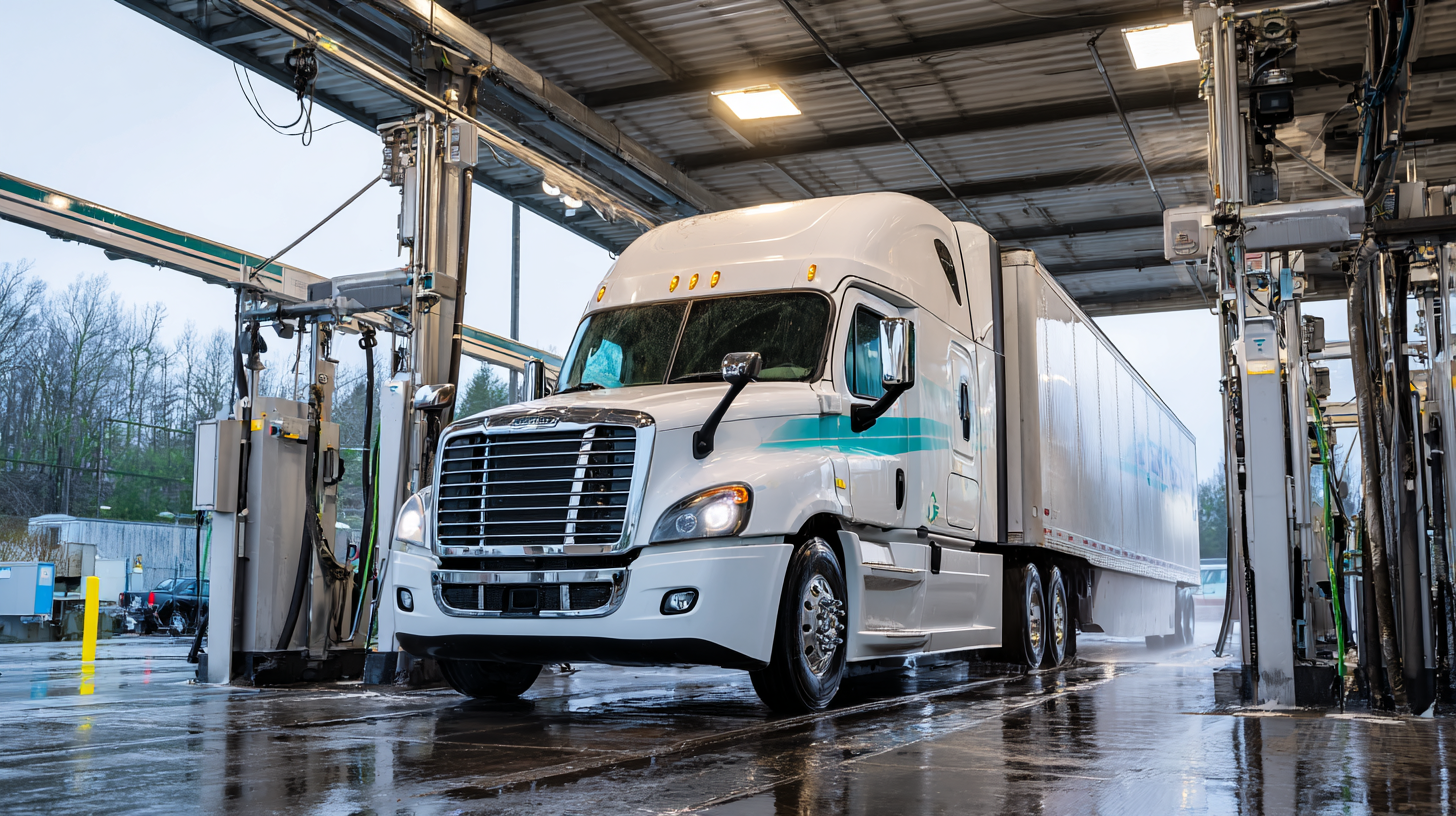The Future of Automatic Semi Truck Wash Systems Transforming Fleet Maintenance
The logistics and transportation industry is witnessing a significant transformation, steering towards modernization and efficiency, particularly in fleet maintenance. The rise of Automatic Semi Truck Wash systems is a critical development in this evolution, combining technology with convenience to streamline vehicular upkeep. According to a recent report by the American Trucking Associations, an estimated 25% of fleet maintenance costs can be attributed to vehicle cleanliness, highlighting the necessity for effective washing solutions. Furthermore, a study by IBISWorld indicates that the truck wash industry is projected to grow at an annual rate of 3.5% over the next five years, driven primarily by advancements in automated washing technologies. These automatic systems not only save time and labor costs but also ensure that trucks are maintained to the highest standards, improving fuel efficiency and vehicle longevity. As we move forward, embracing Automatic Semi Truck Wash solutions will be essential for fleets aiming to optimize their operations and reduce overheads.

Understanding the Evolution of Automatic Semi Truck Wash Systems in Fleet Management
The evolution of automatic semi truck wash systems is playing a critical role in fleet management, particularly with the rising demand for efficient vehicle maintenance. As the Vehicle Management System Market is projected to grow significantly from $19.9 billion USD in 2024 to $43.2 billion USD by 2035, fleet operators are increasingly adopting automated solutions to streamline their operations. These systems not only enhance cleanliness but also contribute to longer vehicle lifespans and reduced maintenance costs.
To ensure the effective performance of automatic wash systems, fleet managers should follow some essential upkeep tips. Regular inspections of the wash machinery can prevent breakdowns and ensure optimal operation. Additionally, selecting the right cleaning agents tailored for heavy-duty vehicles can enhance cleaning efficiency without damaging sensitive components. By investing in proper maintenance strategies, fleets can maximize the benefits of automatic washing systems while maintaining vehicle aesthetics and performance.
Furthermore, the growth in automated carwash technology aligns with emerging trends in vehicle management. As commercial vehicle safety systems integrate more advanced technologies, understanding the maintenance requirements of components like steering gears becomes essential. By focusing on both cleansing and mechanical upkeep, fleet managers can better navigate the challenges of modern fleet management, driving toward a more efficient operational future.
The Impact of Automatic Wash Systems on Operational Efficiency and Cost Reduction
Automatic wash systems for semi trucks are revolutionizing fleet maintenance by significantly enhancing operational efficiency and reducing costs. According to a recent report by the American Trucking Association, fleets can reduce their maintenance costs by up to 10% when using automatic wash systems. These systems not only streamline the washing process but also ensure that trucks are washed more frequently, thereby preventing the buildup of dirt and grime that can lead to corrosion and increased repair costs.
Incorporating automatic wash systems can lead to decreased labor expenses, as fewer staff members are needed for maintenance tasks. A study published in FleetOwner indicated that fleets that implemented automatic washing systems reported savings of approximately $1,500 per month in labor costs alone. Additionally, the systems often utilize advanced technology to recycle water and reduce chemical waste, aligning with sustainability goals while also lowering operational costs.
Tips: When considering an automatic wash system, assess the system's water recycling capabilities to maximize efficiency and cost-effectiveness. Regularly scheduling washes can also prevent long-term maintenance issues, ensuring that your fleet remains in peak condition. Lastly, stay informed about advancements in washing technology, which can further enhance your fleet’s operational efficiency.
The Future of Automatic Semi Truck Wash Systems Transforming Fleet Maintenance
| Dimension | Pre-Automatic Wash System | Post-Automatic Wash System |
|---|---|---|
| Average Wash Time | 30 minutes | 10 minutes |
| Water Usage (per wash) | 100 gallons | 50 gallons |
| Cost per Wash | $25 | $15 |
| Labor Hours (per month) | 40 hours | 10 hours |
| Fleet Downtime (per wash) | 1 hour | 20 minutes |
Key Features to Look for When Choosing Automatic Truck Wash Solutions
When selecting automatic truck wash systems, fleet managers should consider several key features that enhance efficiency and ensure optimal maintenance of their vehicles. According to a report by the American Trucking Association, about 10% of a fleet’s operational costs can be attributed to maintenance, making meticulous care vital. An effective automatic wash system should include high-pressure water jets, eco-friendly cleaning solutions, and advanced drying systems to minimize downtime.
Another crucial aspect is the system's ability to accommodate various truck sizes and configurations. A study conducted by Frost & Sullivan indicates that fleets with versatile washing solutions save an average of 20% in labor costs, as these systems can effortlessly adjust to wash different models without requiring additional manual intervention. Furthermore, integrating smart technology, such as automated scheduling and real-time performance analytics, can significantly enhance a fleet’s maintenance efficiency by providing instant insights into the washing process and frequency, thereby optimizing resource usage while ensuring that trucks always maintain a professional appearance.
Data-Driven Insights: How Automated Wash Systems Improve Fleet Vehicle Longevity
The adoption of automatic semi-truck wash systems is revolutionizing fleet maintenance by leveraging data-driven insights to enhance vehicle longevity. According to industry reports, regular washing can significantly extend the lifespan of fleet vehicles by preventing corrosion from dirt and grime accumulation. Automated wash systems not only save time but also optimize water and cleaning resources. As fleets implement these technologies, the potential to improve operational efficiency and reduce maintenance costs becomes increasingly evident.
Tips: Regularly schedule automatic washes as part of your fleet maintenance to ensure vehicles are consistently maintained. Monitoring wash frequency and vehicle condition can lead to valuable data that informs better maintenance strategies.
Additionally, the integration of advanced technologies, such as AI-powered solutions, plays a pivotal role in streamlining fleet operations. Predictive maintenance enabled by AI can analyze vehicle data to forecast potential issues before they arise, ultimately minimizing downtime and enhancing vehicle reliability. By combining routine washes with intelligent maintenance practices, fleets can maximize their investment in vehicle longevity and performance.
Tips: Utilize predictive analytics to tailor your wash schedule based on vehicle usage patterns, ensuring optimal cleanliness and maintenance without unnecessary expenditure.

Future Trends: Innovations in Automatic Wash Technology for Heavy-Duty Trucks
The heavy-duty truck market is poised for significant growth, with projections indicating a rise from $300 billion in 2024 to $460 billion by 2033, marking a compound annual growth rate of 4.9%. This surge in the market is driving innovations across various sectors, particularly in automatic wash technology for heavy-duty trucks. As fleet maintenance becomes a critical component for operators seeking efficiency, the emergence of automatic semi-truck wash systems is transforming how fleets maintain their vehicles. These technological advancements not only streamline the washing process but also improve the longevity and performance of trucks, ultimately enhancing overall fleet productivity.

Additionally, the trend towards cleaner fuels, such as liquefied natural gas (LNG) and compressed natural gas (CNG), is shaping the landscape of heavy-duty trucks. With LNG consumption projected to exceed 19.76 million tons by 2024, representing a significant 59.6% of China's transportation fuel mix, the need for efficient maintenance solutions like automated washing systems will become even more pressing. As the industry shifts towards hybrid and electric vehicles in response to emissions regulations and carbon reduction goals, the integration of automatic wash systems will be crucial in supporting the evolving demands of a greener logistics sector. The increasing complexity of these vehicles calls for advanced maintenance solutions to ensure their operational reliability and efficiency on the road.
Related Posts
-

Global Success Story: China's Best Self Car Wash Equipment Redefines Quality Standards Worldwide
-

Exploring Innovative Alternatives to Traditional Car Wash Machines for Efficient Cleaning Solutions
-

7 Best Car Wash Machines for Business: Elevate Your Auto Cleaning Game!
-

Understanding the Features of an Automatic Home Car Wash System
-

Ultimate Guide to Selecting the Best Touchless Car Wash Machine for Your Business
-

How to Optimize Your Fleet’s Efficiency with Automatic Semi Truck Wash Solutions